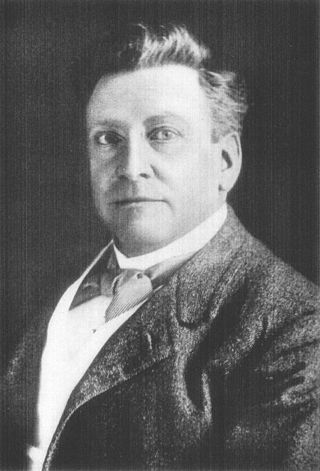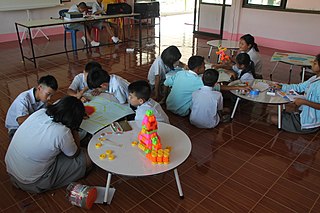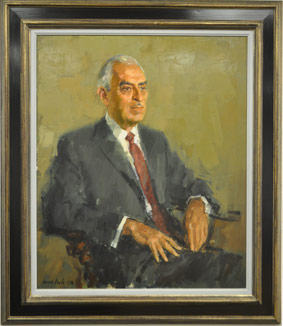
The Royal Society for the Encouragement of Arts, Manufactures and Commerce, commonly known as the Royal Society of Arts (RSA), is a London-based organisation.

The Leverhulme Trust is a large national grant-making organisation in the United Kingdom. It was established in 1925 under the will of the 1st Viscount Leverhulme (1851–1925), with the instruction that its resources should be used to support "scholarships for the purposes of research and education."

Science Foundation Ireland is the statutory body in Ireland with responsibility for funding oriented basic and applied research in the areas of science, technology, engineering and mathematics (STEM) with a strategic focus. The agency was established in 2003 under the Industrial Development Act 2003 and is run by a board appointed by the Minister for Further and Higher Education, Research, Innovation and Science. SFI is an agency of the Department of Further and Higher Education, Research, Innovation and Science.

Matthew Taylor is a British former political strategist and current Chief Executive of the NHS Confederation, having previously led the Royal Society for the Encouragement of Arts, Manufactures and Commerce (RSA) in the United Kingdom between 2006 and 2021. In 2005, he was appointed by incumbent Prime Minister Tony Blair as head of the Number 10 Policy Unit. He is a writer, public speaker and broadcaster who has been a panellist on BBC Radio 4's The Moral Maze since 2008. In October 2016, he was appointed Chair of the Review of Modern Employment established by Prime Minister Theresa May; the Taylor Review report Good Work was published in July 2017.

Project-based learning (PBL) is a student-centered pedagogy that involves a dynamic classroom approach in which it is believed that students acquire a deeper knowledge through active exploration of real-world challenges and problems. Students learn about a subject by working for an extended period of time to investigate and respond to a complex question, challenge, or problem. It is a style of active learning and inquiry-based learning. PBL contrasts with paper-based, rote memorization, or teacher-led instruction that presents established facts or portrays a smooth path to knowledge by instead posing questions, problems, or scenarios.
Shaw Trust is a charitable organisation in the United Kingdom which supports people with complex needs into good work. It was founded in the village of Shaw in Wiltshire in 1982.
The Doctor of Engineering is a professional doctorate in engineering and applied science. An EngD is a terminal degree similar to a PhD in engineering but applicable more in industry rather than in academia. The degree is usually aimed toward working professionals.
The Albert Medal of the Royal Society of Arts (RSA) was instituted in 1864 as a memorial to Prince Albert, who had been President of the Society for 18 years. It was first awarded in 1864 for "distinguished merit in promoting Arts, Manufactures and Commerce". In presenting the Medal, the Society now looks to acknowledge individuals, organizations and groups that lead progress and create positive change within contemporary society in areas that are linked closely to the Society's broad agenda.

The Manufacturing Engineering Centre (MEC) is an international R&D Centre of Excellence for Advanced Manufacturing and Information Technology. The MEC was founded in 1996 under the directorship of Professor Duc Truong Pham. The Centre forms part of Cardiff University, which dates back to 1883 and is one of Britain's major civic universities.
The Fellowship in Manufacturing Management (FMM) is a programme designed for strategic-level managers with careers in manufacturing industry. The award-winning course is held over 15 months and is based at the School of Applied Sciences, part of Cranfield University in Bedfordshire, England. Fellows become full graduate members, namely alumni, of the university.
The Functional Skills Qualification is a frequently required component of post-16 education in England. The aim of Functional Skills is to encourage learners to develop and demonstrate their skills as well as learn how to select and apply skills in ways that are appropriate to their particular context in English, mathematics, ICT and digital skills. They provide a foundation for progression into employment or further technical education and develop skills for everyday life. Functional Skills are generally available in sixth form colleges, further education colleges, and tertiary colleges.
Thinkers in Residence is a program in Adelaide, South Australia, designed to bring leaders in their fields to work with the South Australian community and government in developing new ideas and approaches to problem-solving, and to promote South Australia. Initiated by the state government in 2000 as Adelaide Thinkers in Residence and a global first, it was run by the South Australian government from 2003 to 2012, when funding ceased.

Demetrius Comino OBE was an Australian engineer, inventor, entrepreneur and philanthropist during the 20th century. He invented the slotted angle steel construction system, Dexion, which became widely used internationally for commercial shelving, storage racking, exhibition stands, accommodation, and for domestic purposes. In 1971 he founded the Comino Foundation, an educational charity.

An adjustable shelf is a shelf that can be adjusted according to needs. The most common variant is that the height intervals can be adjusted to accommodate various items. This allows more flexible use to hold items of value for storage, display or sale. Like fixed shelves, the horizontal planes are normally made of strong materials such as wood or steel, but their exact vertical positioning can be varied - usually through the use of uprights into which supporting brackets or the shelves themselves can be fixed at different heights.

Slotted angle is a system of reusable metal strips used to construct shelving, frames, work benches, equipment stands and other structures. The name derives, first, from the use of elongated slots punched into the metal at uniform intervals to enable assembly of structures fixed with nuts and bolts, and second, from the longitudinal folding of the metal strips to form a right angle.

Dexion is a company name and brand particularly associated with the development of the "Dexion" slotted angle steel strip construction system, widely used since the 1950s for domestic and commercial shelving, storage racking, exhibition stands and accommodation purposes.
Constructor Group AS is a Norwegian-registered international company, with headquarters in Oslo, that specialises in the manufacture and supply of shelving, mobile shelving, pallet racking and similar storage systems, primarily for commercial use in offices, factories, warehouses, museums, archives, libraries and retail outlets.

Autism Cymru was Wales' national charity for autism with offices in Cardiff, Wrexham, and Aberystwyth. The charity was established in May 2001 through an initial 3-year grant provided by The Shirley Foundation. The founder chair of the Trustees was Dame Stephanie Shirley of the Shirley Foundation.
National Numeracy is an independent charity based in Brighton, UK, that promotes the importance of numeracy and "everyday maths".

The Foundation of Light is a Registered Charity in the United Kingdom, and is the independent charitable foundation of professional football club Sunderland A.F.C. It is the biggest football charity in the UK.










